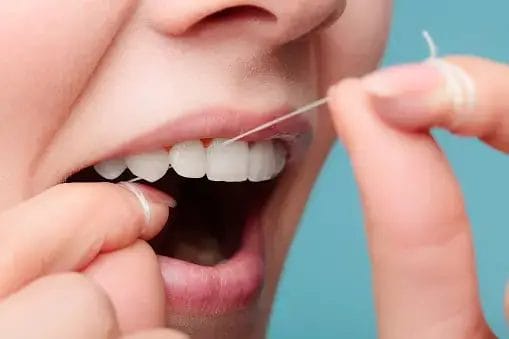Flossing
All Services

If you have difficulty with traditional flossing, or if you're unsure about the proper technique, your dentist or dental hygienist can provide guidance during your regular dental visits. Consistent flossing, along with other good oral hygiene practices, contributes to a healthier mouth and helps prevent dental problems in the long run.
Why Us
If your question is “Why should one floss?” here are some key reasons why flossing is an essential part of maintaining good oral health:
-
Removes Plaque and Debris: Flossing helps remove plaque and food particles from between the teeth and below the gumline. Plaque is a sticky film of bacteria that can lead to tooth decay and gum disease if not properly removed.
-
Prevents Cavities: Flossing reaches areas that a toothbrush may not effectively clean, such as the tight spaces between teeth. Regular flossing helps prevent the formation of cavities by removing the bacteria and debris responsible for tooth decay.
-
Reduces Gum Disease Risk: Gum disease, or periodontal disease, can result from the buildup of plaque and tartar along the gumline. Flossing helps prevent gum disease by removing these deposits and maintaining healthy gums.
-
Freshens Breath: Flossing helps eliminate trapped food particles and bacteria between the teeth, contributing to fresher breath. Poor oral hygiene, including neglecting to floss, can lead to bad breath.
-
Maintains Healthy Gums: Flossing stimulates the gums and helps maintain their health. Healthy gums are essential for supporting teeth and preventing gum recession.
-
Prevents Tartar Buildup: Flossing, along with regular dental cleanings, helps prevent the accumulation of tartar (hardened plaque). Tartar can only be removed by a dental professional and, if left untreated, can lead to more serious oral health issues.
-
Preserves Tooth Enamel: By removing plaque and bacteria, flossing contributes to the preservation of tooth enamel. Enamel is the outer layer of teeth that protects them from decay.
-
Contributes to Overall Health: Oral health is linked to overall health, and conditions such as gum disease have been associated with systemic health issues. Flossing regularly supports not only dental health but may also contribute to overall well-being.
-
Prevents Tooth Decay Between Teeth: Toothbrushes may not effectively reach between teeth, leaving these areas susceptible to decay. Flossing helps remove plaque and prevent decay in these hard-to-reach spaces.
-
Enhances Aesthetic Appearance: Flossing contributes to a cleaner and healthier smile. It helps prevent the development of unsightly conditions such as swollen or bleeding gums.
-
Reduces the Risk of Tooth Loss: Gum disease is a leading cause of tooth loss in adults. By preventing gum disease through proper oral hygiene practices, including flossing, individuals can reduce the risk of losing teeth.
Overall, flossing is a simple yet effective practice that plays a crucial role in preventing dental problems and maintaining optimal oral health. While brushing is important, the combination of regular flossing and brushing, along with routine dental check-ups, provides a comprehensive approach to oral care.
FAQ
Why is flossing important?
In general, it is recommended to have a professional teeth cleaning every six months. However, the frequency may vary based on individual oral health needs. Your dentist or dental hygienist will provide guidance on the ideal schedule for your specific situation.
How often should I floss?
Teeth cleaning is typically not painful. During the cleaning, you may feel some pressure and scraping as the dental professional removes plaque and tartar. If you experience discomfort, it’s essential to communicate with the dental team, as they can make adjustments to ensure your comfort.
What type of floss should I use?
It’s generally recommended not to eat a heavy meal before a dental cleaning, as the process involves various tools and instruments in your mouth. However, having a light meal should not pose a problem. Drinking water is usually fine.
Should I floss before or after brushing?
The duration of a teeth cleaning appointment can vary depending on factors such as the extent of plaque and tartar buildup, the thoroughness of the cleaning, and any additional treatments needed. On average, a routine cleaning appointment may take 30 minutes to an hour.
Can I use a flossing alternative, like a dental pick or water flosser?
X-rays are not always taken during a routine cleaning, but your dentist may recommend them periodically to assess the health of your teeth and identify any issues not visible during the clinical examination.
Is it normal for my gums to bleed when I floss?
Professional teeth cleaning can help remove surface stains from your teeth through the polishing process. However, for deeper stains, additional whitening treatments may be recommended.
Can I reuse dental floss?
Many dental insurance plans cover routine teeth cleaning as a preventive measure. However, coverage may vary, so it’s essential to check with your insurance provider to understand the details of your plan.
Should I floss if I have braces or dental work?
It’s a good practice to maintain your regular oral hygiene routine, but avoid aggressive brushing right before your appointment, as it may cause gum irritation. Your dental professional can better assess your oral health if you’ve maintained your usual routine.
Can children floss?
To maintain good oral hygiene, brush your teeth twice a day, floss daily, use an antiseptic mouthwash if recommended by your dentist, and follow a balanced diet low in sugary foods and drinks.




